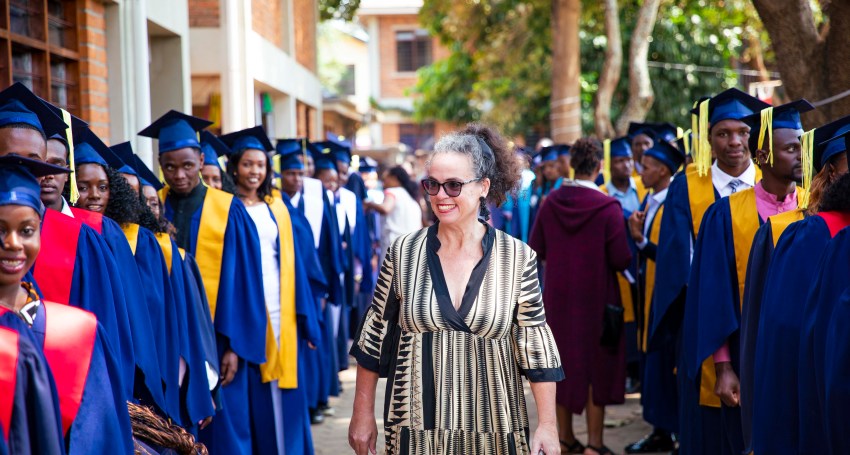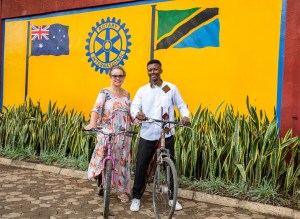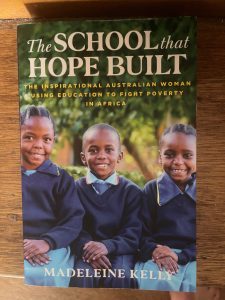From Tanzania with love
National
When Gemma Sisia talks, you listen. The affable Australian humanitarian speaks with enthusiasm as she tells the tale of leaving her homeland to start The School of St Jude in Arusha, Tanzania.

“We started the school with three kids and we now have three schools,” she said during a nationwide fundraising trip around Australia in March.
The Adelaide event, hosted by St Aloysius College and supported by the Rotary Club of Eastwood, promoted the benefits of contributing to scholarships for those who need it most.
In the 23 years since opening The School of St Jude in 2002, the 100 per cent charity-funded school has provided free, quality education to children experiencing extreme poverty. Free scholarships are provided to the 1800 primary and secondary students.
Advertisement
The school also financially supports more than 400 students with their tertiary studies in 10 different countries.
“It’s not just the children who benefit. You can imagine the men and women peddling away on their sewing machines, making uniforms for the kids to wear; to all the hundreds of families of farmers who are growing the thousands of onions, tomatoes, watermelons, bananas and meat that go into the one million hot meals the school provides each year.”
Located across three campuses, St Jude’s provides boarding for all secondary students and employs about 300 Tanzanians.
“They (the boarders) eat a lot and so our cooks have to cook over one million hot meals a year,” Gemma said.
“Sadly, our government is unable to provide any school transport for any of the schools in Tanzania so we have to have our own bus fleet and our own garage.”
Since the graduation of the school’s first cohort in 2015, more than 1000 students have completed their schooling and many have been supported in their tertiary studies.
Gemma refers to her alumni as her “turtles”.
About 15 years ago, a donor from Melbourne came to visit Gemma and gave her a little green ceramic turtle. The donor said to her: ‘When turtles have their babies, they run down to the ocean and nobody sees them for many years because that’s when they’re just trying to survive and not be eaten. Eventually they pop up back on the beach as adults. Your students are going to be the same when they finish their degree or their trade. Don’t feel sad if you don’t see them, because that’s when they’re just trying to move out of home, get a job, learn how to pay the rent, and put three plates on the table a day. In 10 years, you’ll start them seeing them popping up as CEOs and business leaders.’
That’s exactly what happened.
“When my first university graduates started coming out in roughly 2020, I remembered Andrew’s turtle analogy. And I thought, ‘Okay, Gemma, don’t expect anything before 2030 and hopefully by then I will find out whether this whole thing has been a waste of time or not.
“I’m very proud to report that my turtles are already coming back thick and fast.”

Gemma Sisia and St Jude’s old scholar John Stanley.
Their list of achievements is impressive. Some work as Tanzania’s doctors, engineers, tradespeople, entrepreneurs, teachers and creatives.
Among them are St Jude’s old scholar John Stanley, now an entrepreneur with a scholarship to study at the African Leadership University in Mauritius, and St Jude’s staff member Winnie Nemes, both of whom travelled with Gemma to share their stories.
John was thrilled to be part of The Next Frontier Incubator and Small Grants initiative, designed to drive innovation and create even greater opportunities for alumni.
Advertisement
Once selected, participants undergo a structured process, including a screening phase, expert-led boot camps, online lessons and one-on-one mentorship. Guided by a team of mentors, they then develop essential business skills.
“I had this small, crazy idea that Tanzania really needs a good, environmentally friendly fertiliser company,” John said.
“Last year, before I graduated from university, I won my first starter grant with the startup. I’m hoping that by the end of this year, I’ll be able to show you my first product which is not only environmentally friendly but also affordable to the local people.”
John recently secured a second grant to assist with the technical and mechanical side of his fertiliser business.
“I’m hoping that when I get back to Tanzania I will have received the grant money so I can continue to hit the ground running, which is really exciting to me and my team.”
Gemma said she couldn’t have done it without the generosity of others. Most of St Jude’s annual budget comes from Australians.

The School that Hope Built by Madeleine Kelly.
“This year we need to raise around 10 million Australian dollars, but to think that over 90 per cent of that comes from Australia is really quite humbling,” she said.
“All of that tax deductible money arrives in Tanzania so we can use it to build more classrooms, more boarding houses, employ more staff and ultimately enrol more students.”
The event was also attended by Madeleine Kelly, who moved to Tanzania in 2017 and worked alongside Gemma at St Jude’s for six years. Madeleine, who is now back in Adelaide studying a Masters in Teaching, wrote and released a book about St Jude’s. The School that Hope Built was published by Allen & Unwin in 2023 and is available at schoolofstjude.org











